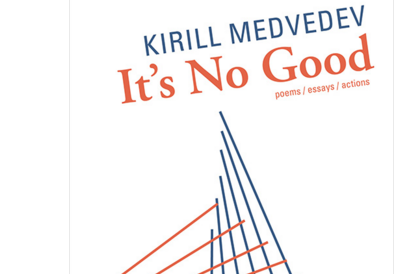It’s no Good is a collection of Russian writer Kirill Medvedev’s poems, essays, actions (mostly reports of his protests), and obituaries, taken from his published books, blog, websites, and Facebook account.
Perhaps reading what appears in the copyright page of the book (“copyright denied by Kirill Medvedev”) and the first lines of the first poem in the collection “I’m tired of translating / I probably won’t translate / anymore” will be enough hint that we are in for a ride that will demand us to look, question, rethink, and look again and again. A writer who makes the choice to leave the literary scene behind is not one you can read and walk away from unscathed.
Medvedev uses everything as “an opportunity to think a little” about what is in the world and is the world around him: from the issue of copyright, to the breasts of a vegetable seller at the market to homeland, to meat to language to a bathrobe, to totalitarianism, to tea, to social aspects of poetry, to human rights, to antidepressants, to different schools of writing, to… He doesn’t let anyone or anything have it easy; both the establishment and the anti-establishment, politicians, businessmen, intellectuals, ordinary people, and he himself are subjected to the scrutiny of his analytical gaze.
In his poems he engages with the everyday, because “there was more life in this scene, of course / than in a pile of battered books”, and it is this very raw everyday-ness of the scenes he recreates that makes the poems magical and poetic. References to Charles Bukowski and Walt Whitman are signals to what he is aiming for, and yet he manages to separate himself from these poets by letting us into his own world and offering his observations and contemplations on it from his particular perspectives.
In his essay-memoir on Russian publisher and editor Dmitry Kuzmin, he writes: “no work of art is a thing in itself, as bourgeois thought claims, nor is it a divine reflection, as religious thought claims, but evidence of all of society’s defects, including the relations of the dominant and dominated. The task of innovative art is to insist on the uniqueness of the individual while revealing the genuine relations between people, the true connections in society, and, as a result, to forge a new reality” (199).
And it is exactly an exploration of this that Medvedev delves into in his work, “pursuing new possibilities for existence in poetry and in life”, demanding a reevaluation of “the relationship between author and work, text and reality, politics and art”:
“so everything’s all right.
“although, maybe the fact that
“everything’s all right is the problem?
“no, that’s not a problem.
“or maybe it’s that when everything’s all right,
“that just doesn’t sit well with me?
“no, it sits well.
“. . .
“(then what the hell?)”
Whether you understand all the aspects of Medvedev’s analyses, whether you agree with Medvedev or not, you’ll benefit from reading and engaging with his views. As editor and translator Keith Gessen notes in the Introduction: “what struck me above all [about Medvedev’s critique of the literary scene in Moscow] was how it answered so many of the questions my friends and I had been struggling with in New York” (15). Kirill Medvedev forces you to think not just about the contemporary Russian condition, but also about our own conditions and so much of what is going on in our worlds as writers and citizens.
***
It’s No Good by Kirill Medvedev. Edited and introduced by Keith Gessen. Translated from the Russian by Keith Gessen with Mark Krotov, Cory Merrill, and Bela Shayevich. Published with n+1 and Ugly Duckling Presse. Second edition, 2016.
*****

